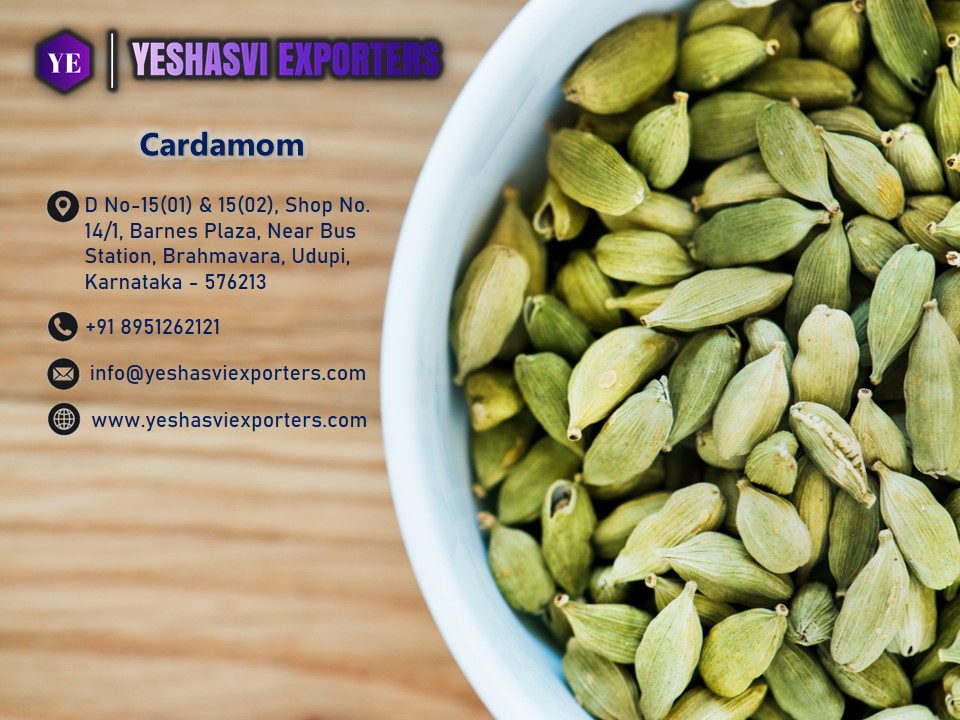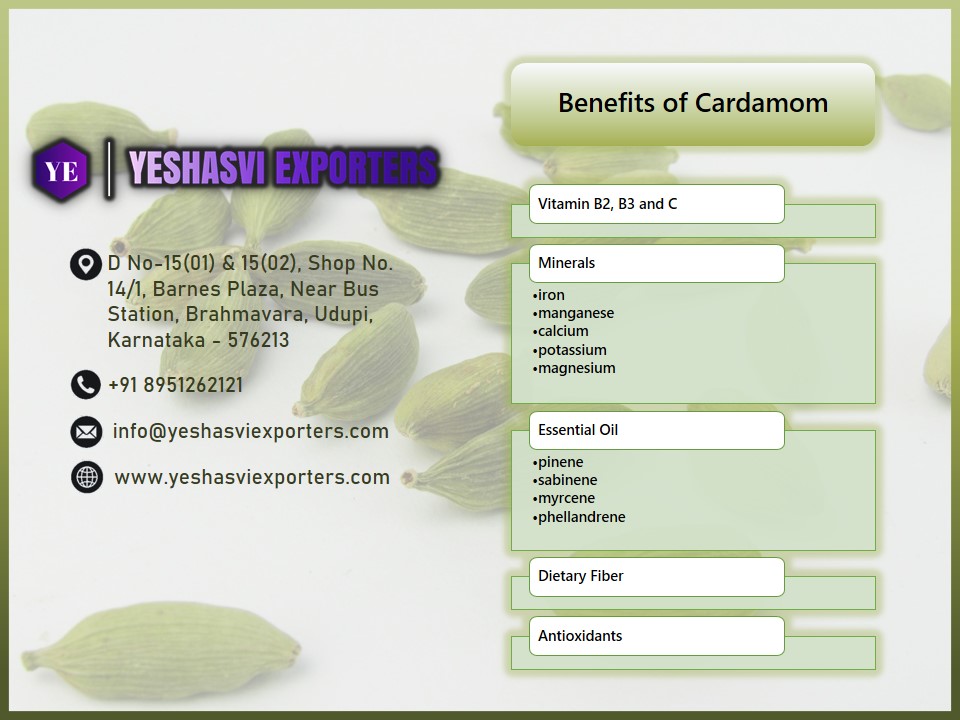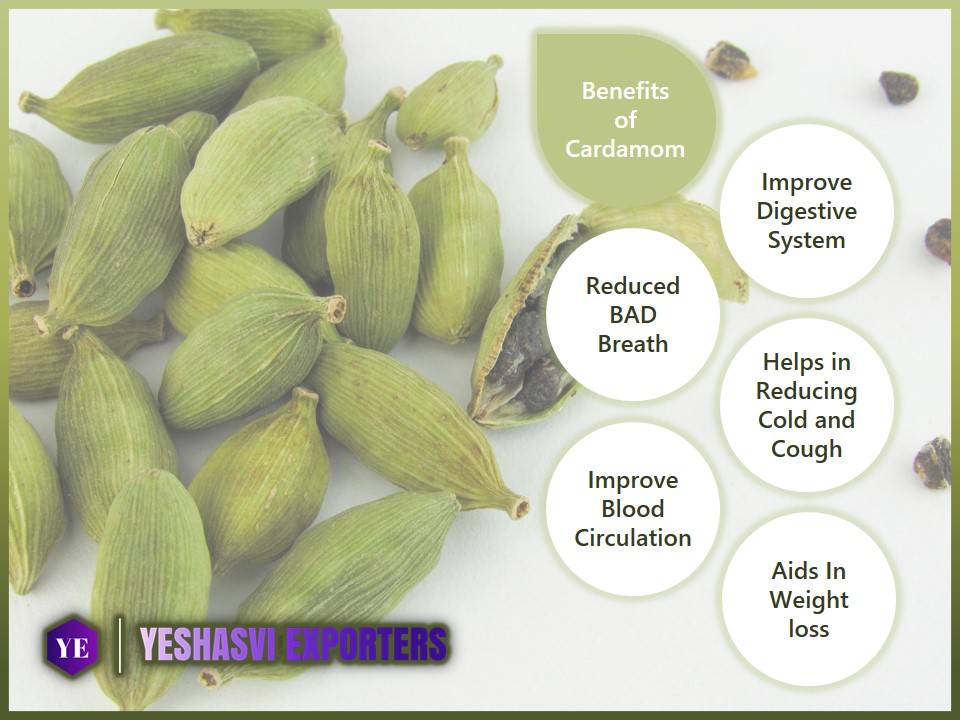Cardamom
Due to its distinct flavor and perfume, cardamom, also known as "elaichi" in Hindi, is a spice that is frequently used in baking and cuisine. In addition to "cardamom" and "elaichi," it is also referred to by a number of other names in other languages and geographical areas of the world.

Cardamom other names:
The following are some other names for cardamom:
Green cardamom: This variety is the most widely used and is frequently known as "cardamom" or "elaichi" in various locales.
Black cardamom:Larger and smokier than other varieties of cardamom, black cardamom is frequently used in savory cuisines. In Hindi, it is also referred to as "kali elaichi."
White cardamom: is a more expensive, rare variety of cardamom that is utilized in several culinary preparations and has a softer flavor. In Hindi, it is also referred to as "sukha elaichi."
Cardamom from Madagascar: This variety of cardamom is indigenous to Madagascar and is prized for its potent flavor and scent. It is also known as "Madagascar vanilla cardamom" at times.
Amomum Cardamom: This variety of cardamom is indigenous to Southeast Asia and is distinguished by its flowery and citrus undertones. Other names for it include "Java cardamom" and "black cardamom."
Elettaria Cardamom: The common green cardamom, which is a member of the Elettaria genus, is known by its botanical name, Elettaria Cardamom. It is also referred to as "genuine cardamom" occasionally.
little cardamom:Green cardamom is frequently referred to as "choti elaichi," a Hindi name that means "little cardamom."
Cardamom is known as the "Queen of Spices" because of its prestigious reputation as a highly coveted spice in various culinary traditions.

Where cardamom is grown?
Especially in South Asia, Southeast Asia, and Central America, cardamom is largely farmed in nations with tropical and subtropical climates. Several of the biggest nations that produce cardamom are:
- India: The southern states of Kerala, Karnataka, and Tamil Nadu are renowned for their premium green cardamom and are among the leading producers and exporters of cardamom in the world.
- Another significant producer of cardamom is Guatemala, particularly the Alta Verapaz region, which is renowned for its superior green cardamom.
- Sri Lanka: Sri Lanka is well-known for its cardamom production, especially in the eastern and central portions of the nation where the chilly, hilly climates are ideal for the plant's growth.
- Tanzania: Tanzania, notably the southern regions of Mbeya and Iringa, is a large producer of cardamom in Africa.
- Nepal: The country of Nepal is renowned for its high-quality huge cardamom output, which is farmed primarily in the eastern districts of Taplejung, Panchthar, and Ilam.
- Thailand: Thailand is a significant cardamom producer, especially in the northern parts of the country where the milder weather and high altitudes are ideal for the growing of cardamom.
Cardamom vs. cloves:
Due to their distinct flavors and fragrant qualities, cardamom and cloves are two spices that are frequently employed in culinary preparations. Even if they have certain things in common, they also differ greatly. This is how cardamom and cloves compare:
- Cardamom has a flavor profile that is sweet, flowery, and slightly lemony, with touches of mint and spice. Desserts, chai tea, and Middle Eastern food frequently use it. Contrarily, cloves have a potent, sweet, and slightly bitter flavor as well as a warming, aromatic scent. They are frequently utilized in mulled beverages, baked foods, and spice blends.
- Cardamom is a spice that has a small, green pod that contains the seeds that are used in cooking. The seeds are tiny, fragrant, and black. Cloves are the dried, nail-shaped, dark brown flower buds of the clove tree.
- Cardamom is used in both sweet and savoury dishes in cooking. It is a vital component in Indian spice mixtures like garam masala and is added to drinks, sweets, and curries. Spice mixtures like pumpkin spice, pickling, and baking all employ cloves as an ingredient. They are frequently added to hams with jewels or used to flavour mulled wine or apple cider.
- Cardamom and cloves are both well known for their possible health advantages. Antioxidant, anti-inflammatory, and digestive effects are thought to exist in cardamom. Additionally, it might benefit oral health and poor breath. The antioxidant, antimicrobial, and analgesic effects of cloves are well established. They are frequently included in herbal treatments for stomach problems, coughs, and toothaches.
- Cardamom and cloves can be combined with other spices or used alone to improve the flavor of a variety of meals. For instance, they are frequently used to make Indian delicacies like spicy cakes and rice pudding. Additionally, they can be used in spice mixtures like chai masala, which often combines cardamom, cloves, and other spices including ginger, cinnamon, and black pepper.
How beneficial it could be for your business to import cardamom from India!

For a company that deals with the import and sale of spices, buying cardamom from India might have a number of advantages. Some of the main advantages are as follows:
High-quality cardamom: India is a major producer and exporter of cardamom, which is prized for its flavor and quality worldwide. A company may stand out in the market and develop a devoted client base by using Indian cardamom, which is renowned for its strong and rich flavor.
Cost-effective: India is renowned for manufacturing top-notch cardamom at affordable costs. A company may retain its profit margins while maintaining the pricing of its products by importing cardamom from India.
An organization that buys cardamom from India may have a steady supply of the spice all year long since it is cultivated there all year long. This can assist in supplying cardamom even when it is not readily accessible elsewhere in the world because of the off-season.
Supply chain diversification: By importing cardamom from India, a company can lessen the risk of supply chain disruptions brought on by unforeseen events in other nations where they typically source cardamoms, such as natural disasters, political unrest, or other unforeseen occurrences.
Cultural significance: Due to its numerous health benefits, cardamom has long been a staple of Indian cuisine. If a company buys cardamom from India, it may capitalize on this cultural importance and market to a larger clientele, including those who are health-conscious and seeking alternative cures.
Potential for growth: India's economy is among the fastest-growing in the world, therefore there is a great deal of room for the cardamom industry there to develop. A company that imports cardamom from India may take advantage of this potential by expanding its market reach, forging alliances with regional growers, and gaining market dominance.